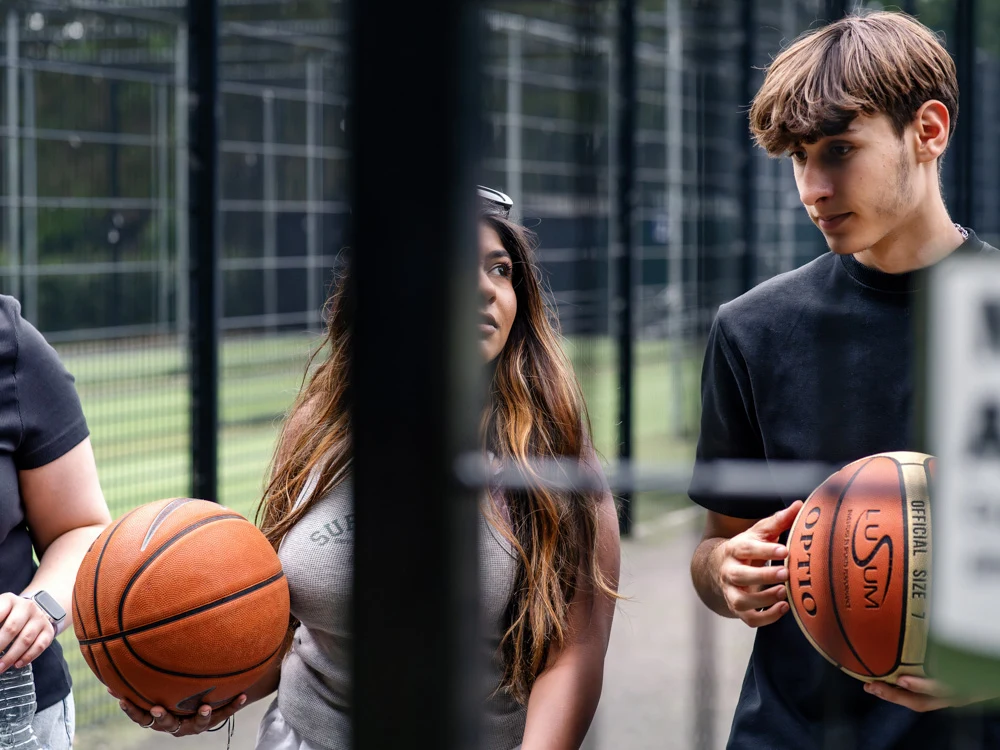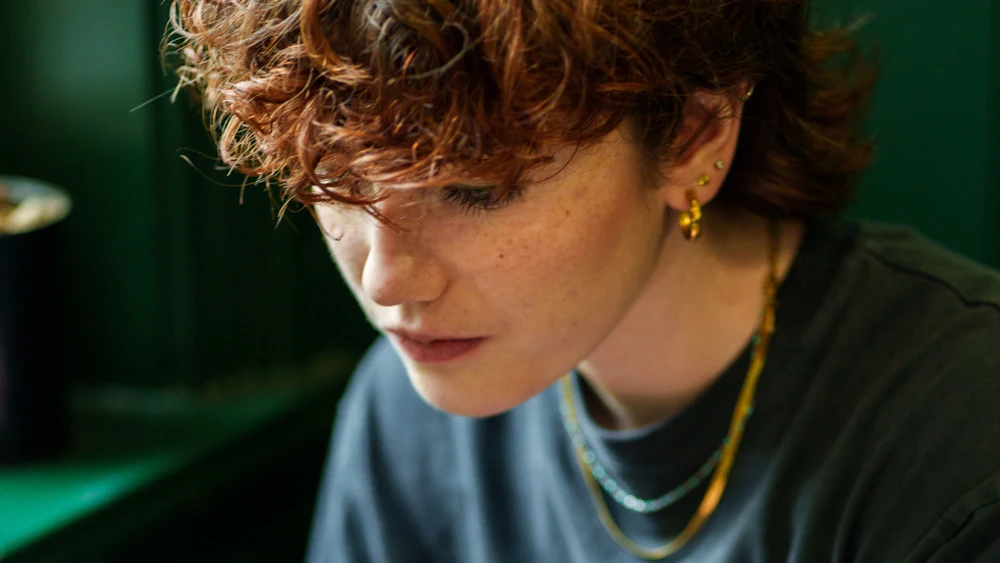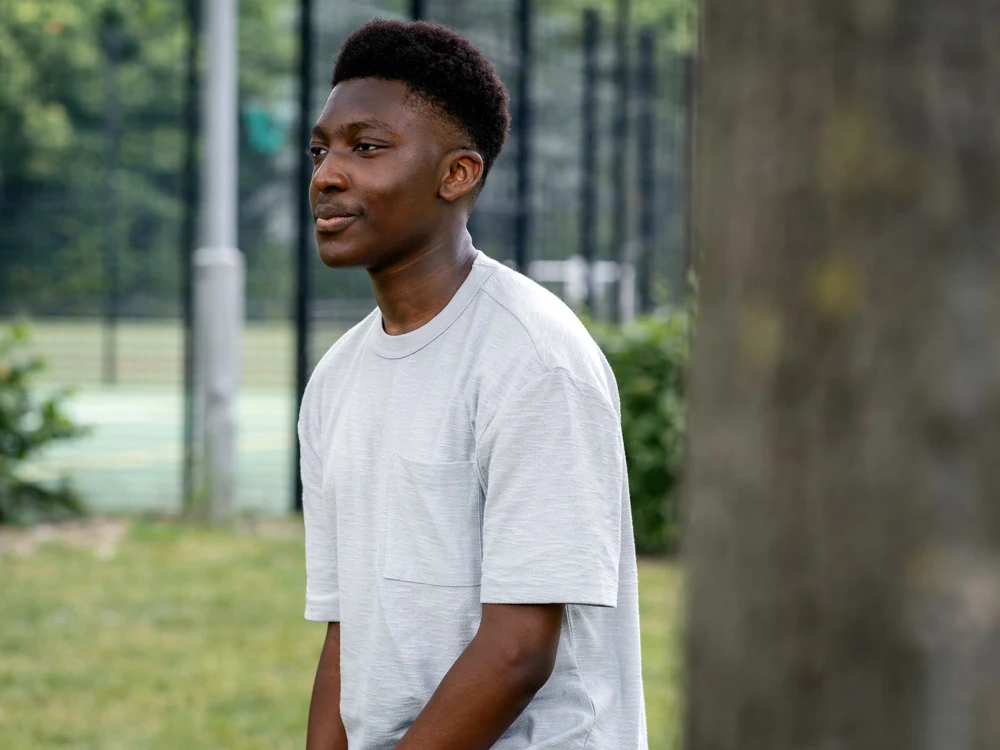We provide support to people in rural communities via our Qwell service through ,our partnership with the wonderful UK farming charity, the Royal Agricultural Benevolent Institution (RABI). As part of this commission we ensure relevant therapeutic content is created on our platform to support others and to elicit further discussion and help-seeking.
Here is one of a number of interviews we have done with key members of the farming community. In this piece, we hear from Sam Stables, a farmer in Herefordshire who started the agricultural charity, We are Farming Minds, to help raise mental health awareness in rural communities.
A childhood coloured by mental health difficulties
“I had a father who suffered with bipolar disorder. Back in around 1990, when I was around nine years old, he was taken into hospital. Mental health wasn’t really talked about the same as it is now.
“As a child, living with somebody who suffered like this was incredibly tough. I don’t have many lovely memories of my childhood. I have memories of playing rugby, which was my absolute passion as a child. But mostly, all I can think about is sad moments.
“I can remember one day my dad was in bed. He told me that he probably wasn’t going to be around very much longer. As a child, that’s pretty tough to listen to.”
Using work as an escape
“My parents weren’t farmers, but I lived in a farming community. All my mates at school were farmers. All I wanted to do was to be a farmer. Farming took me away from the bad stuff at home. Some people might drink, some people turn to drugs, but I turn to work - which isn’t as harmful physically, but it’s hard for my wife and hard for people around me. I literally submerge myself in work to try to combat the negative thoughts that I have.”
Living in a pressure cooker
“Agriculture is certainly a difficult industry. One of the hardest things is to create a business in agriculture with no money.
“As a kid, all I wanted to do was have my own farm one day, and I just worked hard, had some very fortunate opportunities, and created a farming business. I think what led me to the day of the suicide attempt was that I’ve always lived off pressure. The more pressure I was under, the better. If I knew I had to pay a bill, I’d just make it. I lived off just making it and just getting there. The harder I worked, the better I was.
“Farmers love being in control, yet we’re in an industry that’s so out of your control. We can’t do anything about the weather. We can’t do anything about farm prices. And the fact is, you’re never done with farming. It’s not like a conventional nine-to-five job where you have a bad day, you come away from your work, and that’s your day done. The nature of farming is that it’s seven days a week. You live and breathe it, your family’s around it, it's around you all the time, and you can’t get away from it.”
Wishing he’d reached out sooner
“I didn’t want to burden people with my problems because, in my mind, everyone was busy. They had their own issues and their own things to deal with. It just felt that it was the right thing to do - not to be here anymore.
“For me, knowing what I know now, I just wish I’d spoken to somebody far sooner. It needn’t have got to that point. I had worries about talking to someone. Farmers are very proud people, often big burly chaps who don’t like to show vulnerability, thinking ‘I can manage’ or ‘I’ve got to keep going for the family’. And yet, when I came out of hospital, I had neighbours come around to say, ‘Why didn’t you just come and have a word?’
“It was amazing the people that came to me and said, ‘If you’d just come and had a chat, it didn’t need to get to this point.’ And I think that’s the real key with anything, isn’t it? There are people out there to talk to. Nothing’s too big of a deal, no matter how big or small you may think it is.”
How Sam’s learned to cope
“I definitely can’t have too much going on. Now, a couple of things on my plate are enough for me, whereas I was juggling 90 plates before. I’m learning ways, or coping mechanisms, for when I’m feeling the pressure.”
Four ways Sam manages his mental health:
1. Learn to take breaks.
“When I’m working with livestock, if it’s not going right, I just give myself a five or ten-minute break. When things are a bit too much, just walk away and leave it for a while. I know that’s not always possible, but I’m learning; I’m always learning.”
2. Remind yourself when you’ve done your best.
“It’s only been these last two years that I’ve been able to go away with my family for a period of time on holiday. Whereas over the years before, I’ve really struggled to be able to relax, I’ve become better at going away and telling myself, ‘Yes, something could go wrong, but I’ve done everything in my power to make sure that it will be alright.’
“And I always say this, even at lambing time. If we’ve lost a lot of sheep or lambs in a day, I’m always satisfied in my mind so long as I’ve personally done my very best that day, whatever happens then is outta my control; it’s not my fault.”
3. Take time for a wee chat.
“I’m very lucky to have an amazing neighbour; we get on really well. We don’t see each other all the time, but if I’m having a bad day, I can go down to him and we’ll have a five to ten-minute chat about absolute nonsense. And it makes things better. We talk about rubbish, but it’s good I know he’ll be there and I like to think that I’m here for him if he needs me.”
4. Talk to a professional.
“I really believe in talking therapy, and it’s certainly seen massive benefits. We’re seeing the results from farmers who are coming to us saying speaking to an independent person, who isn’t part of our family, has helped massively. I think we have 40 farmers accessing counselling, which is all supported by our charity.”
Combating isolation with community
“Since COVID-19, the general public is aware that isolation has such a detrimental impact on our mental health. Yet, farming is an industry where there’s been isolation for decades. And more so now with so much technology, whereas you used to have four or five people working on a hundred-acre farm, you can have one man managing nearly a thousand acres now. You’ve got a person there who’s on a tractor all day on their own. There are a lot of different things going through their heads, but nobody to talk to.
“A big part of the charity where I see massive success in what we’re doing is creating social gatherings to try and break the isolation. We’re getting groups together. We have an over-fifties group where we meet on a farm - all like-minded farming people who’ve maybe retired or are widows. It just lights up their day.
“We’re doing other things where we’re having family days. We’re putting on activities like clay pigeon shooting. It’s just a bit of time away from the farm because the farm can be a pressure cooker of stress and worry. It’s taking them away from that for a few hours just to try and have time together as a family - ‘cause farmers really struggle with that.”
The future of mental health
“I certainly can see in the agricultural sector that there’s coming to be a greater understanding and acceptance of the part mental health plays in people’s lives and wellbeing. It’s just breaking down that stigma within the community. It’s alright to talk, it’s alright to have a cry.”




